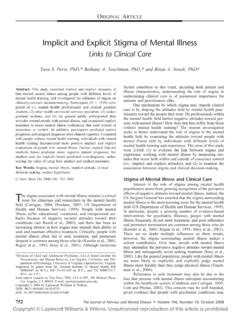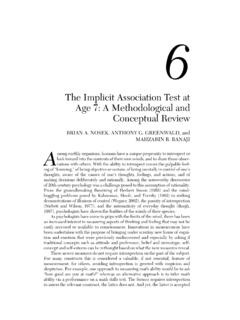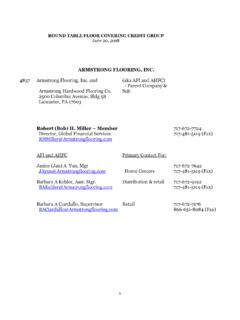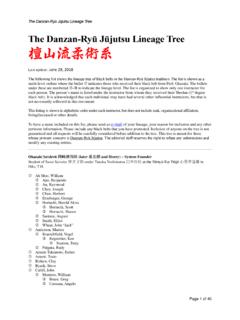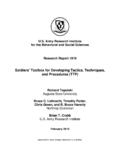Transcription of BRIAN A. NOSEK - ProjectImplicit
1 Last Updated: January 28, 2017 1 BRIAN A. NOSEK University of Virginia, Department of Psychology, Box 400400, Charlottesville, VA 22904-4400 Center for Open Science, 210 Ridge McIntire Rd, Suite 500, Charlottesville, VA 22903-5083 | | Positions 2014- Professor University of Virginia 2013- Executive Director Center for Open Science 2008-2014 Associate Professor University of Virginia 2002-2013 Executive Director Project Implicit 2011-2012 Visiting Scholar CASBS, Stanford University 2008-2011 Director of Graduate Studies University of Virginia 2002-2008 Assistant Professor University of Virginia 2005 Visiting Scholar Stanford University 2001-2002 Exchange Scholar Harvard University Education 2002, Yale University, Psychology Thesis: Moderators of the relationship between implicit and explicit attitudes Advisor: Mahzarin R. Banaji 1999, Yale University, Psychology Thesis: Uses of response latency in social psychology 1998, Yale University, Psychology Thesis: Gender differences in implicit attitudes toward mathematics 1995, California Polytechnic State University, San Luis Obispo, Psychology Minors: Computer Science and Women's Studies Center for Open Science: co-Founder, Executive Director Web site: Primary infrastructure: A non-profit organization that aims to increase openness, integrity, and reproducibility of scientific research.
2 Building tools to facilitate scientists workflow, project management, transparency, and sharing. Community-building for open science practices. Supporting metascience research. Project Implicit: co-Founder Information Site: Research and Education Portal: Project Implicit is a multidisciplinary collaboration and non-profit for research and education in the social and behavioral sciences, especially for research in implicit social cognition. With a staff of research scientists, developers, and technicians, Project Implicit is working toward (a) methodological innovation to increase the viability of psychological research on the Internet, (b) building software to Last Updated: January 28, 2017 2 make web-based research more accessible to scientists, (c) providing impetus for methodological and theoretical innovation in implicit social cognition, and (d) disseminating basic psychological research worldwide through description and interactive demonstration.
3 Research Interests Values and practices; Open science; Metascience; Implicit cognition; Automaticity; Ideology; Attitudes, beliefs, and identity; Morality; Stereotyping and prejudice; Social cognition; Political psychology; Research methodology; Quantitative methods; Technology and Innovation Professional Memberships American Association for the Advancement of Science Association for Psychological Science, Fellow Society of Experimental Social Psychology, Fellow Society for Personality and Social Psychology, Fellow Society for Psychological Study of Social Issues LIFE Research School Honors and Awards 2016 Highly Cited Researchers, Thomson Reuters 2015 Nature s 10: 10 people who mattered this year 2015 Chronicle of Higher Education Influence List 2015 co-author of Reproducibility Project: Psychology that was #8 of Top 100 Stories of 2015 by Discover Magazine, #6 by Science News, #5 in Altmetric100, Nature Magazine s Top Science Stories of 2015, Wired Magazine s Most Winningest Science 2015, New Yorker s 6 Most Interesting Psychology Papers and Most Notable Medical Findings, and a runner-up for Breakthrough of the Year by Science Magazine 2015 Highly Cited Researchers, Thomson Reuters 2014 SPSP Award for Distinguished Service on Behalf of Social and Personality Psychology 2014 Highly Cited Researchers, Thomson Reuters 2013 Nina Strohminger Birthday Wall Post contest, 2nd place 2010 All-University Teaching Award, University of Virginia 2008- Faculty for the International Max Planck Research School on the Life Course (LIFE) 2008 SPN Action Teaching Award, Honorable Mention for Project Implicit web site 2007 International Social Cognition Network (ISCON)
4 Early Career Award 2007 Michele Alexander Early Career Award for Scholarship and Service, Society for the Psychological Study of Social Issues (SPSSI) 2007 Second most cited assistant professor in top Social Psychology programs, SPSP Dialogue 2006 University of Virginia Department of Psychology Outstanding Professor Award 2006 Division of Experimental Psychology Young Investigator Award in Experimental Psychology: General 2005-2008 Max Planck International Research Network on Aging (MaxnetAging), Junior Fellow 2000 Dissertation Fellowship, Yale University 1999 Jane Olejarczyk Award for contribution to graduate student quality of life 1997 Jacob Javits National Fellowship (Alternate) 1996-2000 Yale Graduate School Fellowship Grants, Contracts and Gifts DARPA (PI) 2016-2019 A comprehensive research content and workflow pipeline to increase openness, $1,863,000 Last Updated: January 28, 2017 3 reproducibility, and prediction in social science research Laura and John Arnold Foundation (PI) 2016-2018 Center for Open Science $7,500,000 National Science Foundation (co-PI) 2015-2018 Institutional transformation: Institutional re-engineering ethical discourse in STEM $399,984 Hewlett Foundation (PI) 2015-2016 Planning grant for supporting transparent and reproducible practices in Africa $100,000 Laura and John Arnold Foundation (PI) 2014-2018 Preregistration Prize $1,225,000 Anonymous (PI) 2014-2015 Incubator for Open Tools $310,000 National Institute of Aging and Office of Behavioral and Social Science Research (PI) 2014-2019 Community developing and supporting practices to increase replicability of scientific research $1,165,811 United States-Israel Binational Science Foundation (co-PI) 2014-2018 How evaluative associations influence evaluation.
5 From formation to judgment $184,800 Laura and John Arnold Foundation (PI) 2014-2016 Reproducibility and Statistical Consulting for Researchers $528,500 Fetzer Franklin Fund (PI) 2014-2017 Deciphering the Decline Effect: A Prospective Multi-Laboratory Replication Study $290,723 John Templeton Foundation (PI) 2014-2017 Increasing Scientific Openness and Integrity $2,109,856 Alfred P. Sloan Foundation (PI) 2013-2014 Open Science Framework $500,000 Anonymous (PI) 2013-2014 Center for Open Science: Open Science Framework $400,000 Laura and John Arnold Foundation (PI) 2013-2016 Center for Open Science $7,031,479 Project Implicit (PI) 2008 - 2013 Research Awards $920,081 Department of Education 8/16/10 6/30/12 Jacob K. Javits Fellowship Program for Rebecca Frazier, B. A. $39,428 Last Updated: January 28, 2017 4 National Institutes of Health (PI: F31 AG034796) 12/2009 11/2011 National Research Service Award for Nicole Lindner, M.
6 A. $54,040 National Institutes of Health (co-PI: R21 AG033862) 7/2009 6/2011 Effect of implicit racial bias on patient recommendation for TKR $153,091 National Science Foundation (PI: REC-0634041) 12/2006 11/2009 Implicit Cognition in STEM Education $826,554 Max Planck International Network on Aging (co-PI) 6/2007 5/2008 Anti-age-discrimination rules and their effects on stereotyping 20,000 National Institutes of Health (PI: R01 MH68447) 08/2003 06/2008 A Virtual Laboratory for the Social and Behavioral Sciences $2,529,548 University of Virginia 05/2007 04/2008 Interim Lab Grant $40,000 Indiana University (Subcontract: NIH DA013555) 09/2003 08/2007 Implicit Smoking Cognitions, subcontract $26,830 Darden School of Business (Dr. Greg Fairchild) 09/2005 12/2005 Measuring Implicit Associations, contract $5,000 Harvard University (Dr. Wendy Mendes) 06/2005 05/2006 Measuring Implicit Cognitions, contract $3,100 UT-Memphis (Dr.)
7 Shelley White-Means) 07/2005 12/2005 Investigation of Implicit Cognitions, contract $4,300 Harvard University 2004 - 2005 Measuring Hidden Bias $80,000 UCSF (Fetzer Institute) 06/2005 07/2005 Implicit Mental Health Cognitions, contract $3,300 Rudd Institute/Yale University 3/2004 3/2005 Implicit Weight Bias, contract $5,350 Southern Poverty Law Center 08/2002 09/2003 Measuring Hidden Bias, co-PI $36,500 Rudd Institute 12/2001 12/2003 Implicit Weight Bias, contract $36,020 Publications Last Updated: January 28, 2017 5 h = 60, total times cited = Peer-reviewed journals 1. Moran, T., Bar-Anan, Y., & NOSEK , B. A. (in press). The effect of the validity of co-occurrence on automatic and deliberate evaluation. European Journal of Social Psychology. 2. Ebersole, C. R., Alaei, R., Atherton, O. E., Berstein, M. J., Brown, M., Chartier, C. R., Chung, L. Y., Hermann, A. D., Joy-Gaba, J.
8 A., Line, M. J., Rule, N. O., Sacco, D. F., Vaughn, L. A., & NOSEK , B. A. (2017). Observe, hypothesize, test, repeat: Luttrell, Petty, and Xu (2017) demonstrate good science. Journal of Experimental Social Psychology, 69, 184-186. Doi: 3. Munaf , M. R., NOSEK , B. A., Bishop, D. V. M., Button, K. S., Chambers, C. D., Percie du Sert, N., Simonsohn, U., Wagenmakers, E-J., Ware, J. J., & Ioannidis, J. P. A. (2017). A manifesto for reproducible science. Nature Human Behavior, 1, 0021. Doi: 4. NOSEK , B. A., & Errington, T. M. (2017). Making sense of replications. eLife, 6:23383. Doi: 5. Anderson, C. J., Bahn k, ., Barnett-Cowan, M., Bosco, F. A., Chandler, J., Chartier, C. R., Cheung, F., Christopherson, C. D., Cordes, A., Cremata, E. J., Della Penna, N., Estel, V., Fedor, A., Fitneva, S. A., Frank, M. C., Grange, J. A., Hartshorne, J. K., Hasselman, F., Henninger, F., Jonas, K.
9 J., Lai, C. K., Levitan, C. A., Miller, J. K., Moore, K. S., Meixner, J. M., Munaf , M. R., Neijenhuijs, K. I., Nilsonne, G., NOSEK , B. A., Plessow, F., Prenoveau, J. M., Ricker, A. A., Schmidt, K., Spies, J. R., Stieger, S., Strohminger, N., Sullivan, G. B., van Aert, R. C. M., van Assen, M. A. L. M., van der Hulst, M., Vanpaemel, W., Vianello, M., Voracek, M., & Zuni, K. (2016). Response to a comment on Estimating the reproducibility of psychological science . Science, 351, 1037. Doi: 6. Axt, J. R., Ebersole, C. E., & NOSEK , B. A. (2016). An unintentional, robust, and replicable pro-Black bias in social judgment. Social Cognition, 34, 1-39. 7. Dreber, A., Pfeiffer, T., Almenberg, J., Isaksson, S., Wilson, B., Chen, Y., NOSEK , B. A., & Johannesson, M. (2016). Using prediction markets to estimate the reproducibility of scientific research. Proceedings of the National Academy of Sciences, 112, 15343-15347.
10 Doi: 8. Ebersole, C. R., Axt, J. R., & NOSEK , B. A. (2016). Scientists reputations are based on getting it right, not being right. PLOS Biology, 14, e1002460. Doi: 9. Ebersole, C. R., Atherton, O. E., Belanger, A. L., Skulborstad, H. M., Allen, J. M., Banks, J. B., Baranski, E., Bernstein, M. J., Bonfiglio, D. B. V., Boucher, L., Brown, E. R., Budiman, N. I., Cairo, A. H., Capaldi, C. A., Chartier, C. R., Chung, J. M., Cicero, D. C., Coleman, J. A., Conway, J. G., Davis, W. E., Devos, T., Fletcher, M. M., German, K., Grahe, J. E., Hermann, A. D., Hicks, J. A., Honeycutt, N., Humphrey, B., Janus, B., Johnson, D. J., Joy-Gaba, J. A., Juzeler, H., Keres, A., Kinney, D., Kirshenbaum, J., Klein, R. A., Lucas, R. E., Lustgraaf, C. J. N., Martin, D., Menon, M., Metzger, M., Moloney, J. M., Morse, P. J., Prislin, R., Razza, T., Re, D. E., Rule, N. O., Sacco, D. F., Sauerberger, K.
